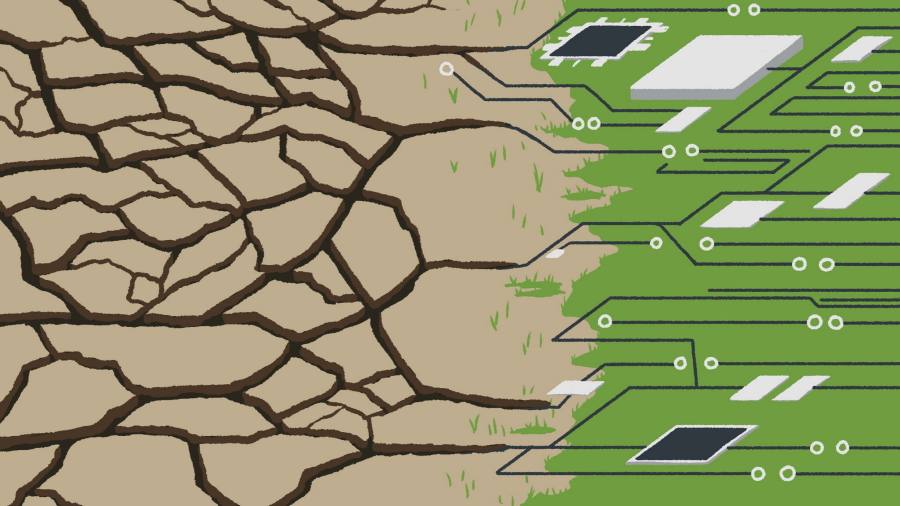It is a phenomenon unleashed by humans that could reshape life as we know it. Troubling warnings from experts have galvanised public concern about it. Boardrooms are scrambling to understand it. Young people fear it will blight their futures. Governments are drawing up rules to tame it.
Yes, this is advanced artificial intelligence. But it also describes another, more familiar threat: climate change.
This year, as galloping gains in AI technology prompt calls for globally co-ordinated regulation, some experts think we should borrow from the international playbook for tackling climate change. And they are right to do so, up to a point. Both problems are inherently global, so a patchwork of national controls won’t work.
But future generations will not thank us for a repeat of the pitfalls that have dogged attempts to control climate change for the past three decades — especially considering the vast benefits AI promises.
Used well, artificial intelligence could transform our management of cancer, poverty and even climate change itself. Global warming, on the other hand, has few upsides. A warmer world might make farms more fruitful and extreme cold less risky in some places. But authoritative scientific reports from the UN’s Intergovernmental Panel on Climate Change clearly state that for human health alone, there are very few examples of beneficial outcomes from climate change at any scale.
Few question the conclusions of these reports, but imagine how hard it would be to co-ordinate efforts to cut carbon emissions if there were no such scientific consensus. Artificial intelligence experts don’t need to imagine. They are deeply divided, politically and technologically, over how much harm might come to whom by when, and how much already exists.
So there is understandable interest in seeing if the IPCC model might work for AI. “This is really an active question among policymakers right now,” Professor Robert Trager, of the Centre for the Governance of AI, tells me.
This makes sense, though considering the breakneck speed of AI advances, an Intergovernmental Panel on Artificial Intelligence would need to be far nimbler than its climate predecessor, which has typically taken six years or so to issue its mammoth reports.
Moreover, the IPCC is part of a wider global climate framework that offers a lot of lessons in what not to do for artificial intelligence.
The panel was established in 1988, a year of climate turning points that mirror many of those we are seeing for AI in 2023. In both years, respected experts have issued jolting warnings. In 1988, Nasa scientist James Hansen testified to the US Senate that “the greenhouse effect has been detected and is changing our climate now”. This was not the first official alarm bell sounded about global warming but it made front-page headlines and bolstered early efforts to address carbon emissions.
Something similar has happened in 2023 as Elon Musk, Apple co-founder Steve Wozniak and more recently, AI “godfather” Geoffrey Hinton have warned of the risks to humanity the technology poses.
This month alone, the G7 has called for new standards to keep AI “trustworthy”, while the White House, US Senate and 10 Downing Street have met AI chiefs to discuss their contentious technology. Meanwhile, the EU is finalising a groundbreaking AI Act aimed at making systems safer and more transparent.
Still, there is growing agreement that international collaboration on AI is needed. Some like the model of the International Atomic Energy Agency. Others prefer the less intrusive example of the International Civil Aviation Organization. It’s an agency of the UN, which is also home to the climate secretariat that emerged after world leaders backed an international treaty to combat climate change in 1992.
Annual meetings of the “conference of the parties” to the treaty, or COPs, led to more detailed climate targets being established in the 1997 Kyoto protocol and 2015 Paris agreement. Yet today, emissions remain at record levels. The reasons for this are complex and manifold but it has not helped that climate COPs have given new meaning to the word “glacial”.
That is partly because COP decisions in effect require consensus from nearly 200 countries — a recipe for hopelessly slow progress and more. In 2018, Trump administration officials helped to block a COP meeting from embracing the conclusions of an IPCC report commissioned at an earlier gathering.
Climate COPs serve a range of useful purposes. We would be far worse off without them. But they also show what must be avoided as we seek ways to ensure that AI works for us, not the other way around.
Read the full article here




